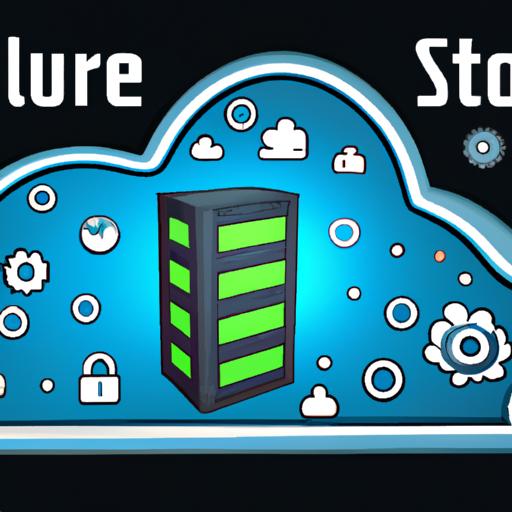What is Stored in the Cloud: Exploring the Digital Vault of Possibilities
In today’s digital era, where data has become the lifeblood of our personal and professional lives, a new form of storage has emerged to revolutionize the way we safeguard and access our valuable information. Welcome to the world of cloud storage, a virtual sanctuary that holds the key to our digital existence. But what exactly is stored in the cloud, and why has it become such an integral part of our lives?
Introduction to Cloud Storage
Imagine a vast warehouse, a virtual library, where your files, documents, photos, and videos are securely stored, accessible at your fingertips from any corner of the globe. That’s the essence of cloud storage. It acts as a digital vault, offering a convenient and reliable solution for storing and retrieving your data.
Cloud storage works by utilizing remote servers that are connected through the internet. Instead of relying on physical hardware like hard drives or flash storage, your data is stored on these remote servers, commonly referred to as “the cloud.” This allows you to access your files anytime, anywhere, as long as you have an internet connection.
In the modern world, where we are constantly on the move, cloud storage has become a game-changer. No longer do we need to carry around bulky storage devices or worry about losing precious data due to hardware malfunctions. With cloud storage, your files are safely tucked away, ready to be accessed whenever and wherever you need them.
But what exactly can you store in the cloud? Join me as we delve deeper into the digital realm and explore the myriad of possibilities that await us. Prepare to unlock the secrets of cloud storage and discover a new level of convenience and peace of mind.
Types of Data Stored in the Cloud
Overview of Different Types of Data
The cloud is an expansive canvas that can accommodate a wide range of data types, catering to the diverse needs of individuals, businesses, and organizations. From essential documents to cherished memories, the cloud offers a secure and versatile space to store a variety of data. Let’s explore some of the key data types that find their home in the cloud.
Documents: The Foundation of Knowledge
Documents form the backbone of our professional and personal lives. From reports and spreadsheets to presentations and contracts, the cloud provides a reliable repository for all your textual creations. With cloud storage, you can bid farewell to the days of sifting through stacks of papers or worrying about misplaced files. Your important documents are just a click away, ensuring seamless collaboration and peace of mind.
Photos: Preserving Precious Memories
In this age of smartphones and digital cameras, our photo collections have grown exponentially. The cloud offers a picturesque sanctuary to safeguard these cherished memories. Whether it’s snapshots of family vacations, milestone achievements, or magical moments captured in time, you can entrust your photo library to the cloud, knowing they’re protected from the risks of data loss or device failure.
Videos: Unleashing Creativity
From funny cat videos to professionally crafted films, videos have become a dominant form of content in the digital realm. Storing videos in the cloud not only saves storage space on your devices but also provides a platform for easy sharing and streaming. Whether you’re a budding filmmaker or a casual videographer, the cloud ensures your videos are securely stored and readily accessible, allowing you to unleash your creativity without constraints.
Music: A Harmonious Haven
For music lovers, the cloud serves as a harmonious haven, offering a space to store and stream their favorite tunes. Say goodbye to the days of carrying around an extensive music collection on physical media. With cloud storage, you can create personalized playlists, access your music library on multiple devices, and enjoy a seamless audio experience, all while keeping your musical treasures safe and sound.
As we have explored the various data types that thrive in the cloud, it becomes evident that this digital vault holds incredible potential. From essential documents to cherished memories, the cloud empowers us to embrace the future while preserving the past. So, why limit yourself to physical storage when the cloud offers a universe of possibilities? Let’s continue our journey into the cloud and uncover even more wonders that await.
Benefits of Storing Data in the Cloud
In this digital age, where data is the currency of progress, cloud storage offers a plethora of benefits that have revolutionized the way we store and manage our valuable information. Let’s explore the advantages that make cloud storage an indispensable tool in our digital arsenal.
Accessibility: Your Data, Anytime, Anywhere
One of the most significant advantages of cloud storage is its unparalleled accessibility. Gone are the days of being tied to a specific device or location to access your files. With cloud storage, you can effortlessly retrieve your data from any internet-connected device, whether it be a laptop, smartphone, or tablet. Whether you’re working on an important project at the office or simply want to share cherished memories with loved ones, the cloud provides seamless access to your files, allowing you to stay connected and productive wherever you go.
Scalability: Expand Your Digital Horizon
The scalability offered by cloud storage is another remarkable benefit that sets it apart from traditional storage methods. With cloud storage, you can easily scale your storage requirements based on your needs. Whether you’re an individual with a growing collection of photos or a business with expanding data demands, the cloud allows you to effortlessly increase or decrease your storage capacity without the hassle of physical hardware upgrades. Say goodbye to the constraints of limited storage space and embrace the freedom to expand your digital horizon as your needs evolve.
Cost-Effectiveness: Saving Your Pennies
Cloud storage presents a cost-effective solution for storing your data. Traditional storage methods often require significant upfront investments in hardware and maintenance costs. With cloud storage, you can eliminate these expenses as you only pay for the storage you actually use. Additionally, the cloud eliminates the need for in-house infrastructure, reducing operational costs associated with maintenance, security, and upgrades. By opting for cloud storage, you can save your hard-earned pennies while enjoying the benefits of secure and reliable data storage.
The benefits of storing data in the cloud extend far beyond accessibility, scalability, and cost-effectiveness. It is a gateway to a digital realm that transcends physical limitations, empowering us to embrace a seamless and efficient way of managing our valuable information. So, why settle for the confines of traditional storage when the cloud offers a world of possibilities? Embrace the cloud, and unlock the true potential of your digital presence.
Security Measures in Cloud Storage
Addressing Concerns Regarding Data Security in the Cloud
When it comes to storing our precious data in the cloud, concerns about security naturally arise. After all, entrusting our personal and sensitive information to remote servers can be daunting. However, cloud storage providers understand the importance of safeguarding your data and have implemented robust security measures to alleviate these concerns.
Explanation of Encryption, Authentication, and Other Security Measures
One of the fundamental security measures employed by cloud storage providers is encryption. Encryption ensures that your data is transformed into an unreadable format, only accessible with the appropriate decryption key. This means that even if unauthorized individuals gain access to your files, they won’t be able to decipher the information without the encryption key.
Additionally, cloud storage providers implement various authentication protocols to verify your identity and ensure that only authorized individuals can access your data. This can include multi-factor authentication, where you need to provide multiple pieces of evidence, such as a password and a unique code sent to your mobile device, to gain access to your cloud storage account.
Furthermore, reputable cloud storage providers invest heavily in data center security. They employ physical security measures like surveillance cameras, biometric authentication, and restricted access to their facilities to protect the servers where your data is stored.
To add an extra layer of security, many cloud storage providers also offer features like file versioning and data backup. File versioning allows you to restore previous versions of your files in case of accidental modifications or deletions. Data backup ensures that your files are replicated and stored in multiple locations, safeguarding against data loss due to hardware failures or natural disasters.
By implementing these comprehensive security measures, cloud storage providers strive to create a safe and secure environment for your valuable data. So, rest assured that your files are protected within the fortified walls of the cloud, allowing you to embrace the convenience and accessibility it offers without compromising on security.
Data Backup and Recovery in the Cloud
Importance of Data Backup and Recovery in Cloud Storage
In the vast and ever-expanding digital landscape, data is not only valuable but also vulnerable. Accidental deletions, hardware failures, or even malicious attacks can lead to the loss of crucial information. That’s where data backup and recovery in cloud storage come to the rescue, acting as a safety net to ensure the continuity and integrity of your cherished files.
When you store your data in the cloud, it’s crucial to have a robust backup and recovery system in place. Think of it as an insurance policy for your digital assets. By regularly backing up your files, you create a copy that can be easily restored in the event of any unforeseen data loss.
Overview of Backup Strategies and Techniques Offered by Cloud Storage Providers
Cloud storage providers offer a variety of backup strategies and techniques to safeguard your data and provide peace of mind. Let’s explore some of the commonly employed methods:
1. Incremental Backups
One popular backup strategy is incremental backups. This approach focuses on backing up only the changes made since the last backup. By identifying and storing only the modified portions of your files, incremental backups are efficient and require less storage space and bandwidth compared to full backups. This method ensures that your backups are up to date while minimizing resource consumption.
2. Versioning
Versioning is a powerful feature offered by many cloud storage providers. It allows you to keep track of different versions of your files, enabling you to revert to previous versions if needed. This feature is particularly useful when you accidentally overwrite a file or need to recover an earlier version that was lost or corrupted. With versioning, you can rest assured that your data remains intact and recoverable.
3. Redundancy and Replication
Cloud storage providers often employ redundancy and replication techniques to enhance data durability and availability. Redundancy involves storing multiple copies of your data across different servers or data centers. This ensures that even if one server or location experiences a failure, your data remains accessible. Replication goes a step further, actively mirroring your data across multiple geographically dispersed locations, minimizing the risk of data loss due to natural disasters or other catastrophic events.
In conclusion, data backup and recovery are essential components of cloud storage. By understanding the importance of backups and exploring the backup strategies and techniques offered by cloud storage providers, you can ensure the safety, availability, and longevity of your valuable digital assets. Embrace the power of backup and recovery in the cloud, and never again fear the loss of your precious data.
Future of Cloud Storage
As we stand on the precipice of technological advancement, the future of cloud storage shines brightly, promising even greater capabilities and possibilities. The digital landscape is constantly evolving, and cloud storage is no exception. So what lies ahead for this revolutionary technology?
Emerging Trends: Edge Computing and Hybrid Cloud Solutions
One of the key trends that will shape the future of cloud storage is edge computing. As data processing demands increase and the need for real-time analysis grows, edge computing brings the power of cloud storage closer to the source. By decentralizing data processing and storage, edge computing reduces latency and enhances performance. Imagine a world where devices are not merely connected to the cloud, but empowered by it, enabling faster decision-making, enhanced AI capabilities, and improved user experiences.
Another trend that will shape the future of cloud storage is the rise of hybrid cloud solutions. Hybrid cloud combines the best of both worlds, blending public and private cloud infrastructure. This allows organizations to leverage the scalability and cost-effectiveness of public clouds while maintaining control over sensitive data through private clouds. The flexibility and agility offered by hybrid cloud solutions provide businesses with the ability to optimize their storage and computing resources based on their unique needs.
Unlimited Possibilities
The future of cloud storage holds unlimited possibilities. As technology evolves, we can expect to see advancements in areas such as security, performance, and accessibility. Encryption algorithms will become more robust, ensuring the confidentiality and integrity of our stored data. Innovations in cloud infrastructure will continue to enhance speed and reliability, making data retrieval seamless and instant.
Furthermore, the integration of artificial intelligence and machine learning into cloud storage systems will unlock new insights and efficiencies. Imagine a cloud storage system that not only securely stores your files but also analyzes them, offering intelligent recommendations and predictive insights.
In conclusion, the future of cloud storage is bright and full of potential. It will continue to revolutionize the way we store, access, and utilize our data. As we embark on this journey of technological advancement, let us embrace the limitless possibilities that cloud storage brings, empowering us to navigate the digital landscape with ease and confidence. So, are you ready to embrace the future and unlock the true potential of the cloud?






